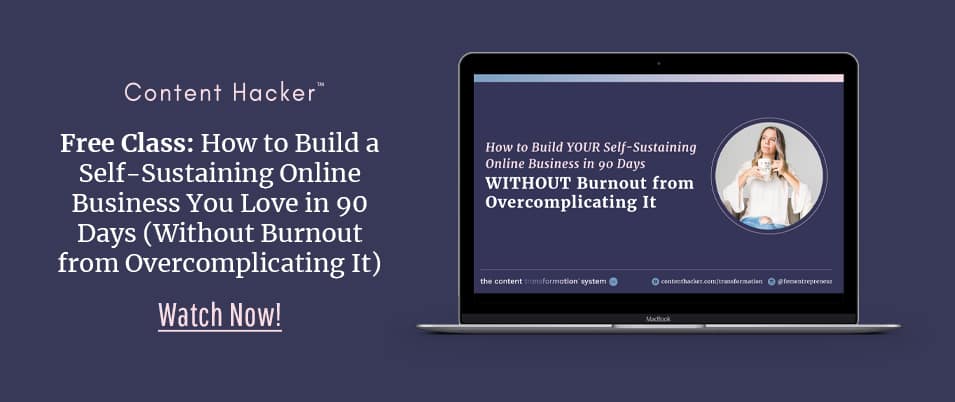Blogging length is a tricky topic that writers, creatives, bloggers, and entrepreneurs have been discussing for years.
And years. And YEARS.
Especially if you’re a newbie, the question has probably plagued you countless times:
“How long should this blog post be?? What’s the ideal blogging length?”
Let me answer your questions with some additional questions. 😂
- What are your goals?
- Who is your audience?
- What’s your topic?
Each of these things should deeply affect the length of the blog you want to write.
And the length of the blog you write, in turn, will affect everything from the engagement you get on the finished post, to your search engine ranking, to the number of conversions you get.
Yep. It’s that important.
So, while there’s no perfect blogging length, while there’s no “one size fits all” that will win you all the traffic, rankings, engagement, whatever you crave…
If you want to earn REAL traffic and dividends from your blog…
There ARE ways to determine whether your blog post length is correct for the goals you want to hit. 🎯
And there are some basic, data-backed guidelines that will help you write to the best length possible, no matter the situation, topic, audience, or goal.
Let’s get into the details.
Pssst… Serious business owners understand and invest in the right content strategy (which includes blogging length guidelines!) for amazing results. If you want to get serious, too, learn what else you need to become a member of the “successful” club in my free guide, The Serious Business Owner Map.
What Does the Data Say About Blogging Length?
The data out there about blogging length is… well… mixed.
However, one trend continuously stands out if you analyze the various studies.
Long-form blog content wins. 🏆
Here’s why (plus two other trends we can glean from multiple studies out there).
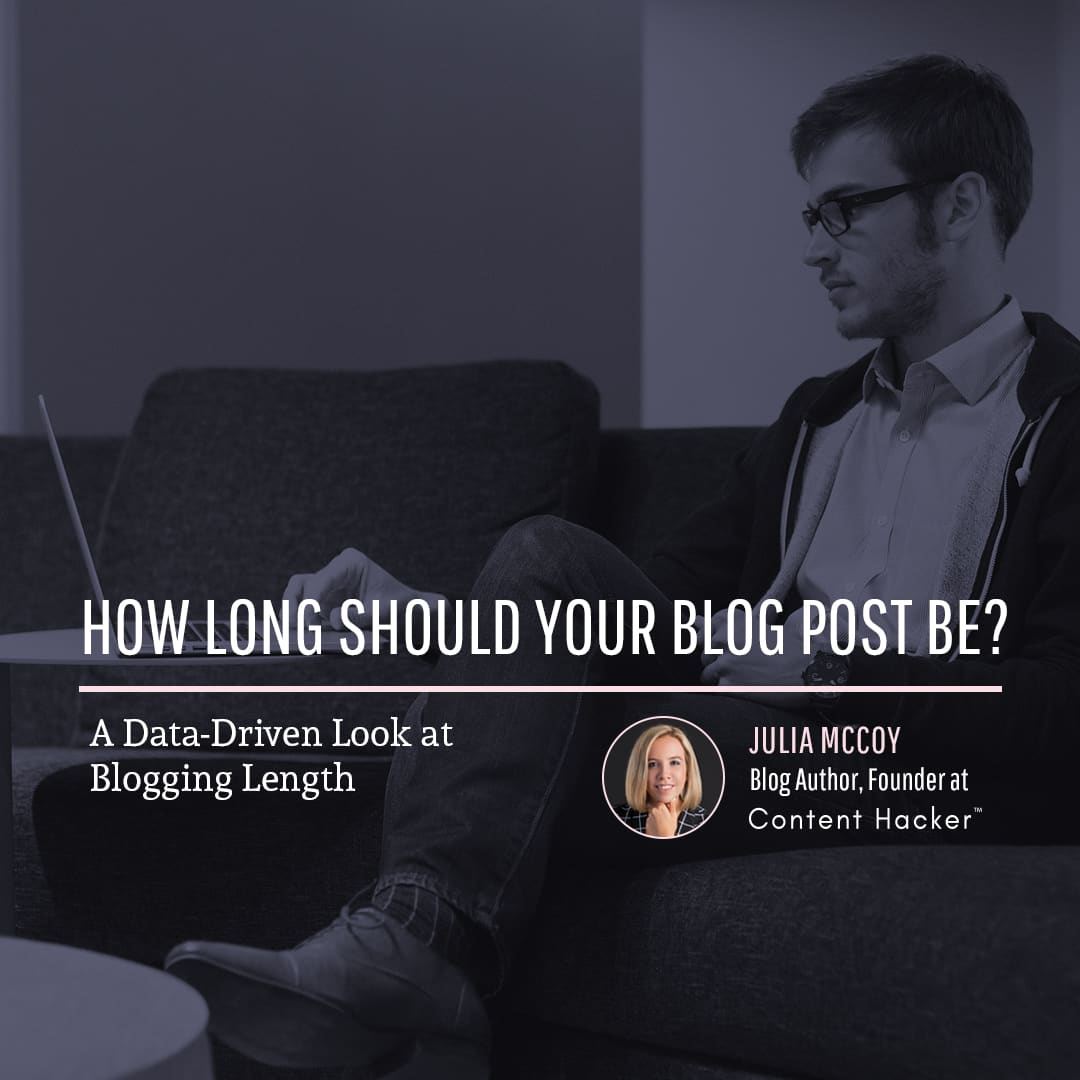
1. Long-Form Is Best When It Comes to Blogging Length
Long-form content is generally defined as any content piece with a word count of 1,000 or more.
Why is long-form so… lauded? Let’s dig into the studies.
Moz and BuzzSumo: Long-Form Content Gets More Shares & Links
A classic Moz and BuzzSumo study of one million articles looked at which content formats get shares and links, and how those two things correlate.
One piece of the study specifically looked at blogging length, including posts under 1,000 words and posts over 1,000 words. The findings were pretty definitive.
- 85% of blogs are less than 1,000 words long…
- …However, blogs over 1,000 words in length routinely get more shares and links.
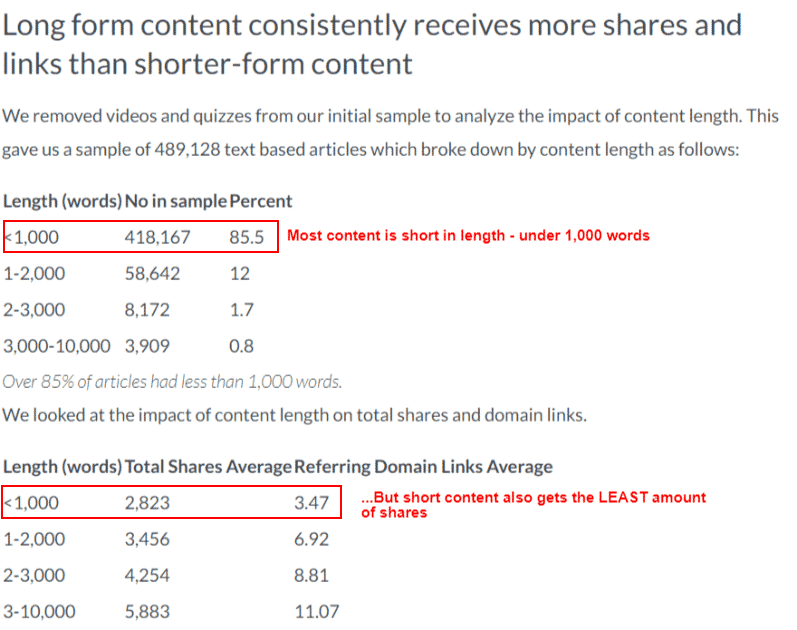
Backlinko: Long-Form Posts Get More Backlinks
Another study from Backlinko analyzed 11.8 million Google search results to find out which factors correlate to high rankings.
Length was one of them. Specifically:
- The study found that comprehensive, in-depth posts, which tend to be longer, “significantly outperformed” content that was not in-depth.
- The top 10 results in Google have evenly distributed word counts. On average, posts appearing on page one have a length of 1,447 words.
- Long-form content gets more backlinks than short-form content.
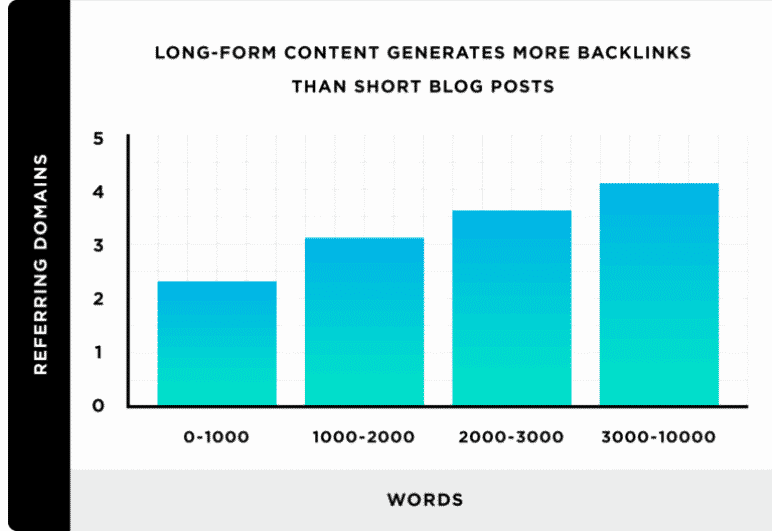
SerpIQ: Google Favors Long-Form Content
Another study that corroborates the importance of long-form content for ranking is SerpIQ’s.
This one looked at 20,000 keywords and found that the average content length among Google’s top 10 results was over 2,000 words.
For the #1 spot, the average word count was 2,416.
Now, this study is dependent on which keywords, exactly, were looked at within those 20,000. If a lot of comprehensive topics were represented, then that would skew the results.
However, it’s telling that the average word count across the #10 spot in Google was 2,032 – still over 2,000 words!
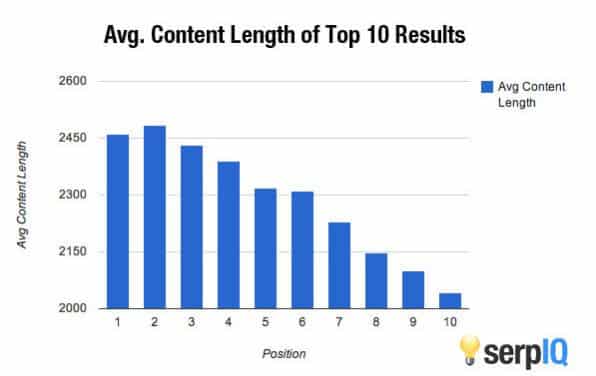
Finally, let’s look at one last study in favor of content over 1,000 words.
Orbit Media: Bloggers Who Create Long-Form Posts Win
Orbit Media surveys 1,000+ bloggers every year to find out the trends surfacing in content. Regarding blogging length…
Blogs are getting longer on average each year. Since 2014, average length has increased by 57%.
Why? Perhaps more bloggers are understanding that long-form content works better for hitting their goals, so they’re transitioning to longer content in their creation line-ups.
In 2021, the average word count for blogs was 1,416.
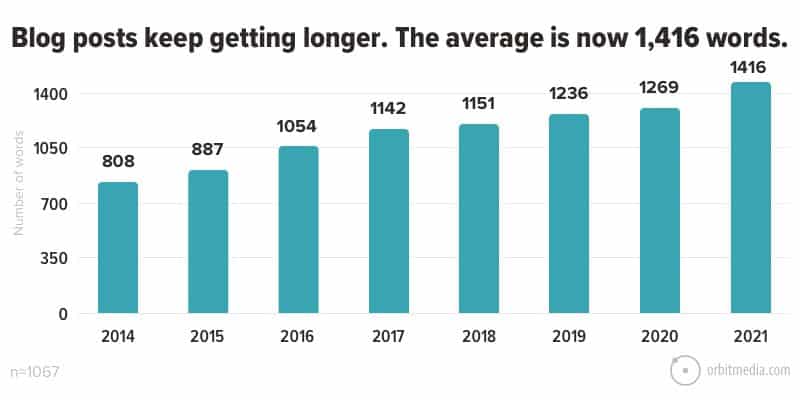
And, as you can see from the chart below, the number of people posting blogs less than 1,000 words has sharply declined over the last eight years.
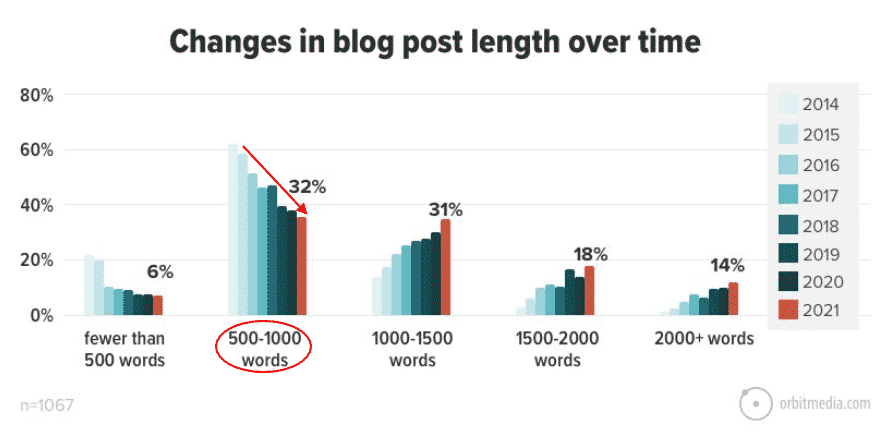
But, despite the mountain of data in its favor, most people still aren’t creating long-form content!
Only 18% of bloggers create posts 1,500-2,000 words in length — and among these are some of the top content marketers in the field, by the way. Meanwhile, 69% of bloggers go for 1,500 words or shorter in their posts. 🤯
This might be one of the reasons WHY long-form content does so well. It’s relatively rare – creators either don’t invest in it or don’t understand the worth of it – so if you create a great long-form post, you won’t have much competition.
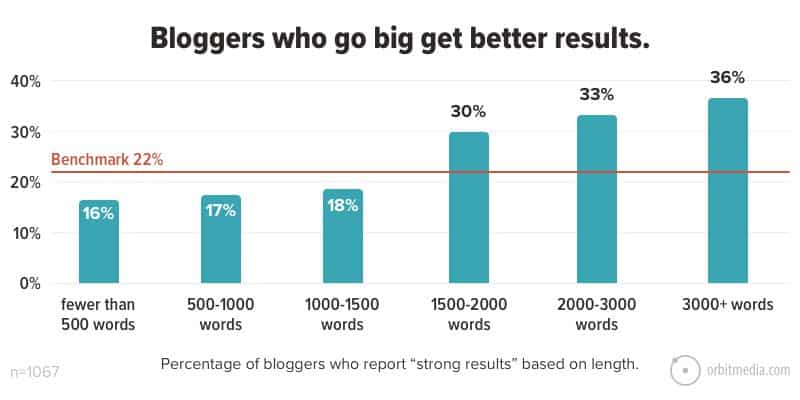
The data doesn’t lie. In most situations, long-form (over 1,000 words) is better.
Creating content with the right strategy is just one facet of running a successful online business. What else do you need? Get the low-down in my free class.
2. …But Don’t Go Too Long If Traffic Is Your Goal
So far, the studies overwhelmingly favor long-form content.
But, does that mean you should make your content as long as possible, no matter what?
Not so fast. 🛑
A HubSpot study, in particular, should make you think twice before adopting this technique (“Long-form or die!” ☠).
HubSpot: Longer Blogs DON’T Get More Traffic
One facet of the study looked at the effect of blogging length on traffic.
Spoiler: Long-form content between 2,250 and 2,500 words earns the most traffic.
But what about content longer than 2,500 words?
Once you go over 2,500 words in length, traffic drops – noticeably so.
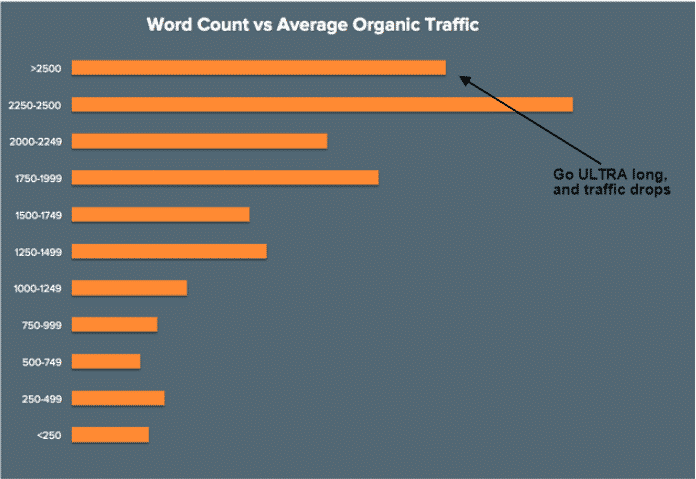
However, let’s not gloss over the fact that this study ALSO found that the longer the blog post – over 2,500 words – the more shares and backlinks it earned.
There may be a good reason for these correlations, though. Let me explain. ⬇
3. What Matters More Than Blogging Length? VALUE
What do long blog posts have in common?
More length = more comprehensiveness. More depth. More information. More thoroughness. If a blog post is long, it’s generally more likely to have all of these things.
Overall, these elements contribute to the value of your blog post for readers.
Think about it. Which types of blog posts tend to leave you feeling satisfied? Which ones tend to answer your questions fully and thoroughly?
Which blog posts answer questions you didn’t even know you had?
The answer every time is probably long-form posts.
There’s immense value in providing thorough, comprehensive information to your readers that answers their questions and solves their problems definitively.
And that value is ultimately what makes those long-form posts more shareable, more link-worthy, and more engaging overall.
So, don’t stuff your blog posts with words, stuff them with VALUE. This might naturally make them longer, but that’s not the point.
The point is to provide the answers your users need on a particular topic. Nothing more. Nothing less.
A survey of Search Engine Journal’s audience underscores the fact that blogging length is utterly relative.
Search Engine Journal: There Is No All-Around Perfect Blogging Length
SEJ asked their readers what content length they recommend if ranking well is the goal. The results were downright mixed.
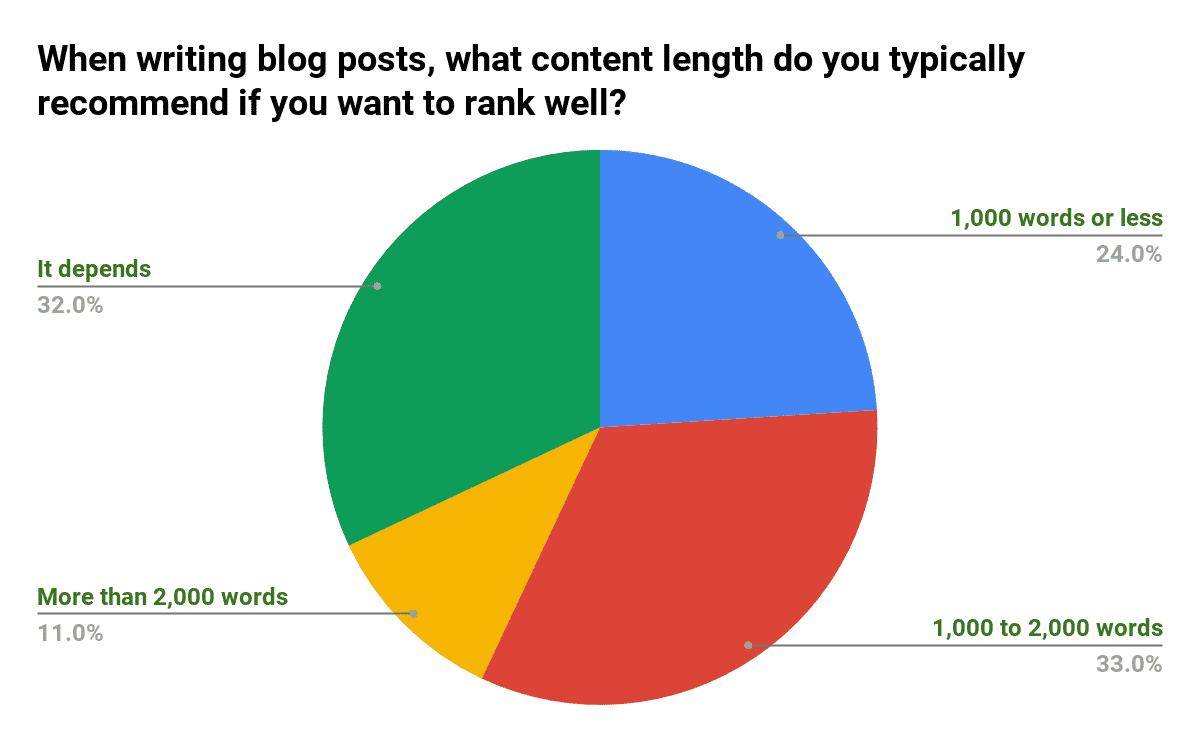
- 33% of the audience said they would shoot for 1,000 to 2,000 words…
- But another 32% said “It depends”!
- Oddly, the third-largest chunk of people (24%) said to shoot for 1,000 words or less, which suggests a lot of people really have no idea what blogging length is best. 🤷♀️ Unless you have a specific goal that calls for less words (or unless you’re Seth Godin), if we follow the data, writing such a short post doesn’t lead to results.
Okay. We’ve covered the blogging length studies. 📑
We’ve examined the data. 🕵️♀️
We know long-form is best in most situations. 📏
It’s time to put that into motion. How do you figure out EXACTLY what word count to use in your new post? Should you go for 1,500 words? 2,000? 2,500+??
Keep reading. 👇
Blogging Length Quick Guide: 3 Factors That Should Determine Your Word Count
As we’ve discussed, blogging length should be dependent on three main factors:
- Your goals
- Your audience
- Your topic/keywords
Let’s talk about how you might approach blog length based on each one.
1. Goals
Whenever we talk about content strategy, we have to talk about goals. A content piece with no goals attached to it probably won’t perform.
So, consider:
What do you want your content piece to DO once it’s out in the world? Your goal for your blog post will influence its length, to some degree.
Ask yourself:
- Is SEO your goal? Do you want your blog to rank well and draw traffic to your website through Google’s first page? 2,250-2,500 words is a good benchmark, but examine the top of Google to get clear on exact word count. (More on this later.)
- Do you want your content to increase brand awareness? Content over 2,500 words gets the most shares, according to the data we discussed above.
- Do you want to invite comments and discussion? Do you want to create a buzz? Shorter, punchier opinion posts tend to spark debate. You could potentially get away with less than 1,000 words in this instance. (Use sparingly on your blog, as short posts are terrible for SEO, backlinks, and engagement. Consider creating these posts on social media for the best impact.)
While goals are important to consider, they shouldn’t be the last word on content length. Don’t forget to think about your audience’s needs, too.
2. Audience
There are three major audience factors to consider when planning out a blog post, and thus determining blogging length:
- What does your audience already know about your topic?
- What does your audience need to know?
- What questions will they have?
Making sure these elements are covered in your blog post will directly affect the length.
In the first place, you must understand your audience well enough to know what they need from your content. Without that basic knowledge, you’ll be lost.
The awareness of your audience – what they know, what they don’t know yet, what they need to know about your topic, industry, service, products – makes all the difference.
As you can see, it’s a domino effect.
Without deep knowledge of your ideal prospects, you won’t understand their awareness about the topics you want to write about. As a result, you’ll have a harder time figuring out how long your blog posts should be.
In other words, if you’re worried about blog length but don’t have a clear understanding of who you’re talking to and what they need, it’s time to go back a few steps.
Particularly, go back to square one with audience research. Talk to them, find out exactly who they are, and record what you find. Create a few ideal client avatars (ICAs) so you’ll have tools to use in the future for content creation.
Struggling with the basic steps needed to set up your digital business and content marketing? Need some guidance from experts who have been there, done that?
You need a spot in my coaching program, The Content Transformation System. You’ll get 1:1 mentorship on key principles of great content, including how to create an ICA and other core business drivers.
I built a sustainable 7-figure business out of content marketing, and I’m teaching you how to do the very same thing in this program, open by application only. Learn more right here.
3. Topic/Keywords
The last but possibly most important factor for determining content length is your topic/keywords.
This is even more true if your goal is SEO.
The subject you’re writing about needs to be addressed thoroughly if you want to rank.
Note: Thoroughness doesn’t automatically equal extra length. You can be thorough and brief, too! The key is to write to the length the topic demands. If you’re writing and find yourself adding fluff to pad the word count, that’s a sign you should dial back.
Conversely, if you write a too-short post and leave gaping holes and unanswered questions dangling for your readers, you’ll never reach page one on Google.
The depth and length of your post will depend on the depth of the topic you’re covering.
Some topics will be intricate, and thus will require a lot of words to explain thoroughly so your reader gains understanding.
On the other hand, some topics are incredibly simple, and won’t need much explaining. (Hence, fewer words. 📏)
For example, let’s compare two different topics/keywords side-by-side: “what is brand awareness” and “how to build a brand strategy.”
For “what is brand awareness,” the tippy-top of Google’s organic results shows us content with an average word count of 320 words in length.
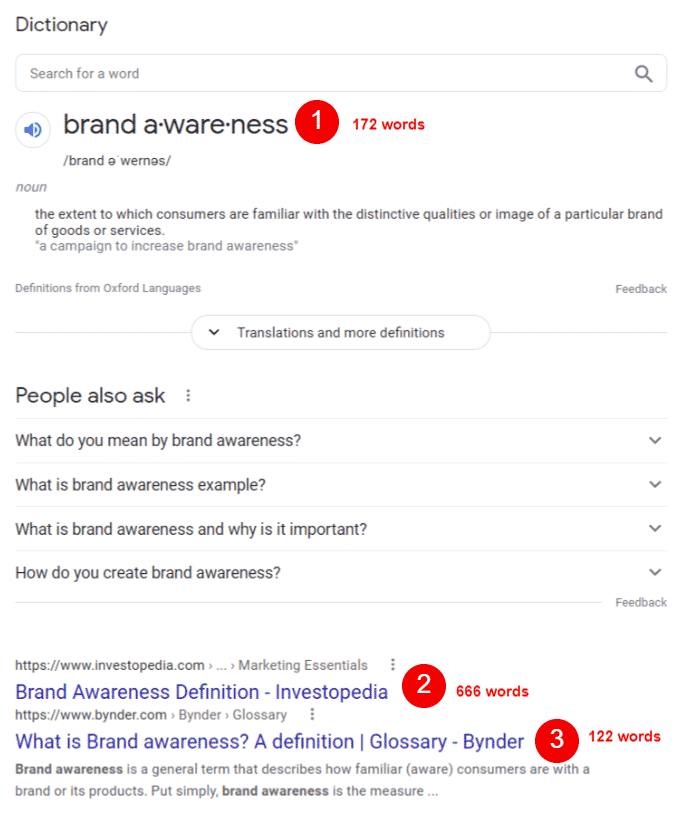
In this topic’s SERP (search engine results page), it’s telling that Google shows us a definition for “brand awareness” off the bat. When people search for this keyword/topic, they’re probably looking for just that – a simple explanation.
Hence, the short, sweet articles that offer a quick, helpful definition on the topic are ranking higher than some ultimate guides thousands of words in length. 💡
Now, let’s turn to the more in-depth topic, “how to build a brand strategy.”
The average word count across the top three organic results is 2,539.
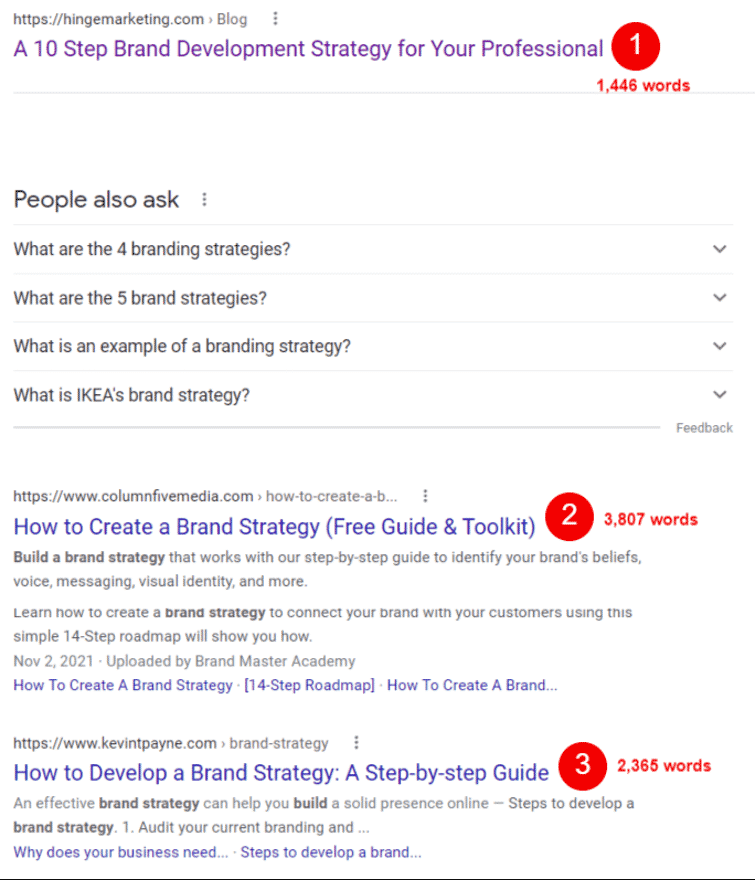
These posts are vastly longer, and vastly more in-depth. There are tons of steps to building a brand strategy, like this featured snippet shows:
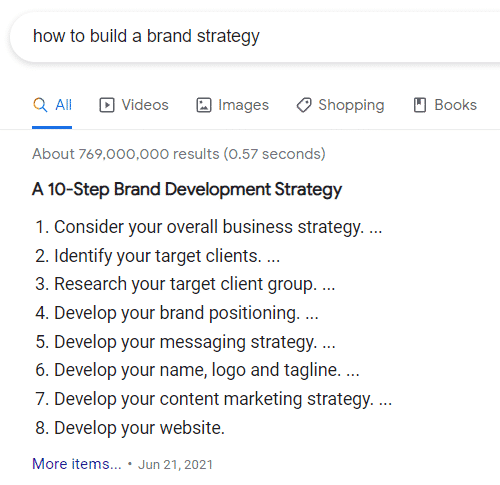
People aren’t just looking for a simple explanation, here. They want a step-by-step how-to complete with examples and guidance. The topic calls for more, and Google is ranking the posts that provide the needed depth.
However, keep in mind the number one ranking post isn’t the longest! Depth doesn’t necessarily equal excessive length. Sometimes, an explanation can be so concise, definitive, and clear, you don’t need extra words.
Granted, only truly talented writers can pull that off. You have to be good at explaining complicated concepts in as few words as possible without leaving behind any dangling questions.
That’s super tough. Thus, most of us will need more words to explain a complex subject clearly.
Bonus Tip #1: Consider Content Type to Determine Word Count & Blogging Length
Different types of content tend to call for different word counts.
For example:
- A guide you’re writing to teach your audience about a specific topic should generally be longer than a post meant to generate discussion.
- A how-to post, where you show your audience how to do something, should be longer than a news post, where you’re simply sharing a news story.
See how that works? When in doubt, consider the type of content you want to write and how long you would expect that type to be in most situations.
Bonus Tip #2: Still Unsure How Long Your Blog Post Should Be? Check Google Search
I already demonstrated this process a bit in the points above, but here’s an explainer.
If your goal for your blog post is search engine rankings, you need to be cognizant of the competition.
What’s already at the top of Google? That’s a great benchmark for what your blog post ALSO needs in order to slide into the rankings.
You need to provide better answers to the questions users ask about your topic.
And, to be better, you need the right word count.
The posts already ranking in the top three address the topic/keyword in a satisfying way according to Google’s standards. And Google’s standards are dependent on users’ standards.
Google wants to rank content that users find relevant, helpful, and useful.

Google’s guidelines are centered on users. What satisfies users will rank! Source: Google Webmaster Guidelines
So, studying the word count and content of the top three posts gives you a hint on how many words you’ll need to write an even more satisfying blog.
Bottom line: You should never have to guess at blogging length. You can use research to help you figure out a ballpark estimate of how long your post should be, especially if SEO is your goal.
Blogging Length: Do You Have to be Responsible for All Your Blogging Tasks?
Blogging length is a big deal for content success.
If you don’t hit the right word count in your posts, your content will be largely unsatisfying to read. 👎
Your readers will click away from your site feeling disgruntled. They’ll have unanswered questions hanging over their heads, ones they’ll need to keep combing Google to find.
That means they’ll turn to other brands, other content, to find what they need.
You’ll literally be turning away readers – potential customers – if you consistently ignore or neglect blogging length.
Don’t do it.
Invest the necessary time and attention to write to the right word count, every time.
That said, should YOU be the one totally in charge of writing those satisfying blog posts that gain rankings and reader trust?
Entrepreneurs, here’s a fun fact:
YOU should not be writing and “doing” all your content. 😱
What, Julia???!
Yes. I’m a writer, and the majority of my blogs are ghostwritten for me so I can build my business. *gasp*
However, I believe entrepreneurs should be in the ideation part. That’s where I change lanes with many top marketers that aren’t even involved in their own ideas anymore. You’ll never find me out of the idea stages of anything I do.
But the doing? You shouldn’t be doing that. It’s a myth to believe you can’t outsource.
You should be outsourcing content and growing your business.
Interested in learning how to grow your business, build great content, and scale without breaking?
We teach that in a powerful, comprehensive 90-day coaching + course hybrid program. Learn more about our Content Transformation System.





